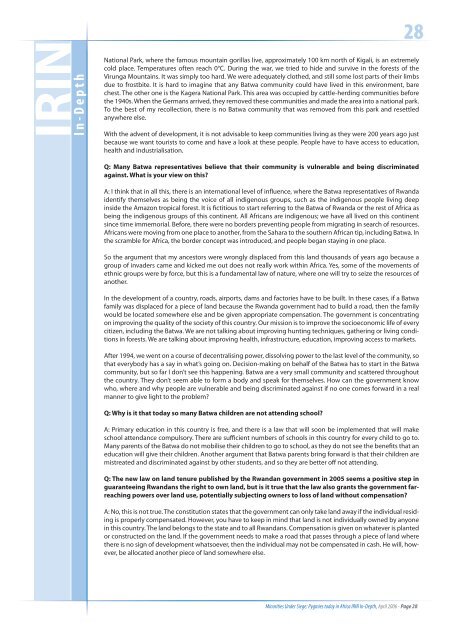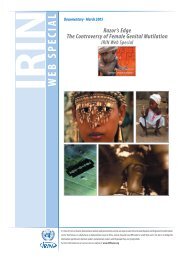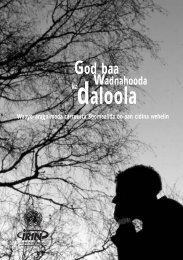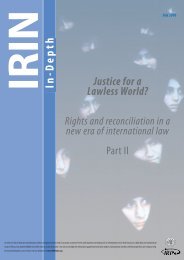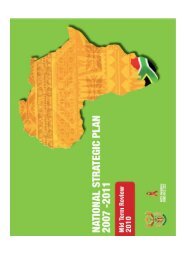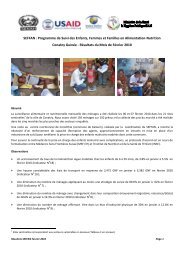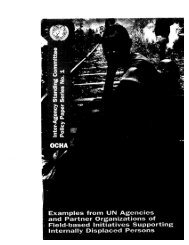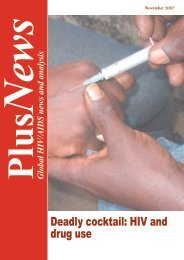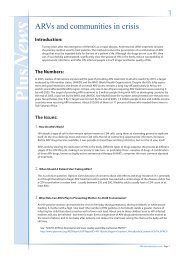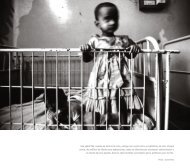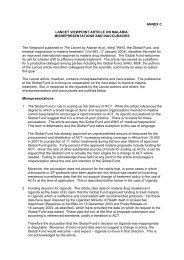Minorities Under Siege: Pygmies today in Africa - IRIN
Minorities Under Siege: Pygmies today in Africa - IRIN
Minorities Under Siege: Pygmies today in Africa - IRIN
You also want an ePaper? Increase the reach of your titles
YUMPU automatically turns print PDFs into web optimized ePapers that Google loves.
<strong>IRIN</strong><br />
I n - D e p t h<br />
28<br />
National Park, where the famous mounta<strong>in</strong> gorillas live, approximately 100 km north of Kigali, is an extremely<br />
cold place. Temperatures often reach 0°C. Dur<strong>in</strong>g the war, we tried to hide and survive <strong>in</strong> the forests of the<br />
Virunga Mounta<strong>in</strong>s. It was simply too hard. We were adequately clothed, and still some lost parts of their limbs<br />
due to frostbite. It is hard to imag<strong>in</strong>e that any Batwa community could have lived <strong>in</strong> this environment, bare<br />
chest. The other one is the Kagera National Park. This area was occupied by cattle-herd<strong>in</strong>g communities before<br />
the 1940s. When the Germans arrived, they removed these communities and made the area <strong>in</strong>to a national park.<br />
To the best of my recollection, there is no Batwa community that was removed from this park and resettled<br />
anywhere else.<br />
With the advent of development, it is not advisable to keep communities liv<strong>in</strong>g as they were 200 years ago just<br />
because we want tourists to come and have a look at these people. People have to have access to education,<br />
health and <strong>in</strong>dustrialisation.<br />
Q: Many Batwa representatives believe that their community is vulnerable and be<strong>in</strong>g discrim<strong>in</strong>ated<br />
aga<strong>in</strong>st. What is your view on this?<br />
A: I th<strong>in</strong>k that <strong>in</strong> all this, there is an <strong>in</strong>ternational level of <strong>in</strong>fluence, where the Batwa representatives of Rwanda<br />
identify themselves as be<strong>in</strong>g the voice of all <strong>in</strong>digenous groups, such as the <strong>in</strong>digenous people liv<strong>in</strong>g deep<br />
<strong>in</strong>side the Amazon tropical forest. It is fictitious to start referr<strong>in</strong>g to the Batwa of Rwanda or the rest of <strong>Africa</strong> as<br />
be<strong>in</strong>g the <strong>in</strong>digenous groups of this cont<strong>in</strong>ent. All <strong>Africa</strong>ns are <strong>in</strong>digenous; we have all lived on this cont<strong>in</strong>ent<br />
s<strong>in</strong>ce time immemorial. Before, there were no borders prevent<strong>in</strong>g people from migrat<strong>in</strong>g <strong>in</strong> search of resources.<br />
<strong>Africa</strong>ns were mov<strong>in</strong>g from one place to another, from the Sahara to the southern <strong>Africa</strong>n tip, <strong>in</strong>clud<strong>in</strong>g Batwa. In<br />
the scramble for <strong>Africa</strong>, the border concept was <strong>in</strong>troduced, and people began stay<strong>in</strong>g <strong>in</strong> one place.<br />
So the argument that my ancestors were wrongly displaced from this land thousands of years ago because a<br />
group of <strong>in</strong>vaders came and kicked me out does not really work with<strong>in</strong> <strong>Africa</strong>. Yes, some of the movements of<br />
ethnic groups were by force, but this is a fundamental law of nature, where one will try to seize the resources of<br />
another.<br />
In the development of a country, roads, airports, dams and factories have to be built. In these cases, if a Batwa<br />
family was displaced for a piece of land because the Rwanda government had to build a road, then the family<br />
would be located somewhere else and be given appropriate compensation. The government is concentrat<strong>in</strong>g<br />
on improv<strong>in</strong>g the quality of the society of this country. Our mission is to improve the socioeconomic life of every<br />
citizen, <strong>in</strong>clud<strong>in</strong>g the Batwa. We are not talk<strong>in</strong>g about improv<strong>in</strong>g hunt<strong>in</strong>g techniques, gather<strong>in</strong>g or liv<strong>in</strong>g conditions<br />
<strong>in</strong> forests. We are talk<strong>in</strong>g about improv<strong>in</strong>g health, <strong>in</strong>frastructure, education, improv<strong>in</strong>g access to markets.<br />
After 1994, we went on a course of decentralis<strong>in</strong>g power, dissolv<strong>in</strong>g power to the last level of the community, so<br />
that everybody has a say <strong>in</strong> what’s go<strong>in</strong>g on. Decision-mak<strong>in</strong>g on behalf of the Batwa has to start <strong>in</strong> the Batwa<br />
community, but so far I don’t see this happen<strong>in</strong>g. Batwa are a very small community and scattered throughout<br />
the country. They don’t seem able to form a body and speak for themselves. How can the government know<br />
who, where and why people are vulnerable and be<strong>in</strong>g discrim<strong>in</strong>ated aga<strong>in</strong>st if no one comes forward <strong>in</strong> a real<br />
manner to give light to the problem?<br />
Q: Why is it that <strong>today</strong> so many Batwa children are not attend<strong>in</strong>g school?<br />
A: Primary education <strong>in</strong> this country is free, and there is a law that will soon be implemented that will make<br />
school attendance compulsory. There are sufficient numbers of schools <strong>in</strong> this country for every child to go to.<br />
Many parents of the Batwa do not mobilise their children to go to school, as they do not see the benefits that an<br />
education will give their children. Another argument that Batwa parents br<strong>in</strong>g forward is that their children are<br />
mistreated and discrim<strong>in</strong>ated aga<strong>in</strong>st by other students, and so they are better off not attend<strong>in</strong>g.<br />
Q: The new law on land tenure published by the Rwandan government <strong>in</strong> 2005 seems a positive step <strong>in</strong><br />
guarantee<strong>in</strong>g Rwandans the right to own land, but is it true that the law also grants the government farreach<strong>in</strong>g<br />
powers over land use, potentially subject<strong>in</strong>g owners to loss of land without compensation?<br />
A: No, this is not true. The constitution states that the government can only take land away if the <strong>in</strong>dividual resid<strong>in</strong>g<br />
is properly compensated. However, you have to keep <strong>in</strong> m<strong>in</strong>d that land is not <strong>in</strong>dividually owned by anyone<br />
<strong>in</strong> this country. The land belongs to the state and to all Rwandans. Compensation is given on whatever is planted<br />
or constructed on the land. If the government needs to make a road that passes through a piece of land where<br />
there is no sign of development whatsoever, then the <strong>in</strong>dividual may not be compensated <strong>in</strong> cash. He will, however,<br />
be allocated another piece of land somewhere else.<br />
<strong>M<strong>in</strong>orities</strong> <strong>Under</strong> <strong>Siege</strong>: <strong>Pygmies</strong> <strong>today</strong> <strong>in</strong> <strong>Africa</strong> <strong>IRIN</strong> In-Depth, April 2006 - Page 28


